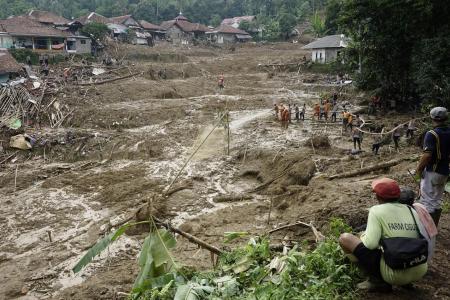60 dead in Jakarta floods after biggest rainfall since records began
Death toll in Indonesia's capital rises after heaviest one-day rainfall since 1866; blackouts and mudslides hampering rescue efforts
JAKARTA: Landslides and floods triggered by torrential downpours have left at least 60 people dead in and around Indonesia's capital, as rescuers struggled to search for people buried under tons of mud, officials said Saturday.
Indonesia's meteorological department said it was the heaviest one-day rainfall since Dutch colonists began keeping records in 1866 and blamed rising global temperatures.
"The impact of a one degree increase can be severe," the head of the agency Dwikorita Karnawati told a news conference on Friday. "Among that is these floods."
Monsoon rains and rising rivers submerged a dozen districts in the greater Jakarta area and caused landslides that buried at least a dozen people. National Disaster Mitigation Agency spokesman Agus Wibowo said most of the fatalities included those who had drowned or been electrocuted since rivers broke their banks early Wednesday, after extreme torrential rains hit on New Year's Eve. Three elderly people died of hypothermia.
It is the worst flooding in the area since 2007, when 80 people were killed over 10 days.
Rescuers recovered more bodies as flash floods and mudslides destroyed several villages in Lebak, a district in neighbouring Banten province, Mr Wibowo said.
Rescuers were still searching for two villagers reportedly missing in the landslide, he said.
The number of fatalities is expected to increase, with rescuers and villagers also searching for at least three people believed to be buried in another landslide in Cigudeg village in Bogor district, said Mr Ridwan, the village's secretary, who goes by a single name.
Mr Ridwan said bad weather, blackouts and mudslides were hampering rescue efforts. He said rescuers on Saturday managed to reach eight hamlets that had been isolated for days by cut-off roads and mudslides and rescued more than 1,700 villagers in weak condition.
Four days after the region of 30 million people was struck by flash floods, waters have receded in many middle-class districts, but conditions remain grim in narrow riverside alleys where the city's poor live.
Government data showed that some 92,200 people were still unable to return home and were crammed at damp emergency shelters, mostly in the hardest-hit area of Bekasi. The number was sharply reduced from 173,000 as the muddy waters which submerged much of the city up to 2m high receded. - AP, REUTERS
Get The New Paper on your phone with the free TNP app. Download from the Apple App Store or Google Play Store now



